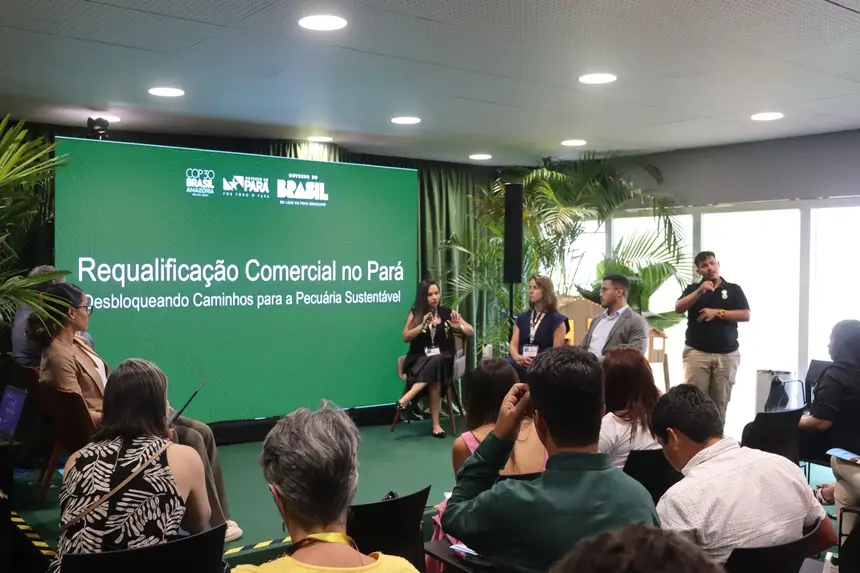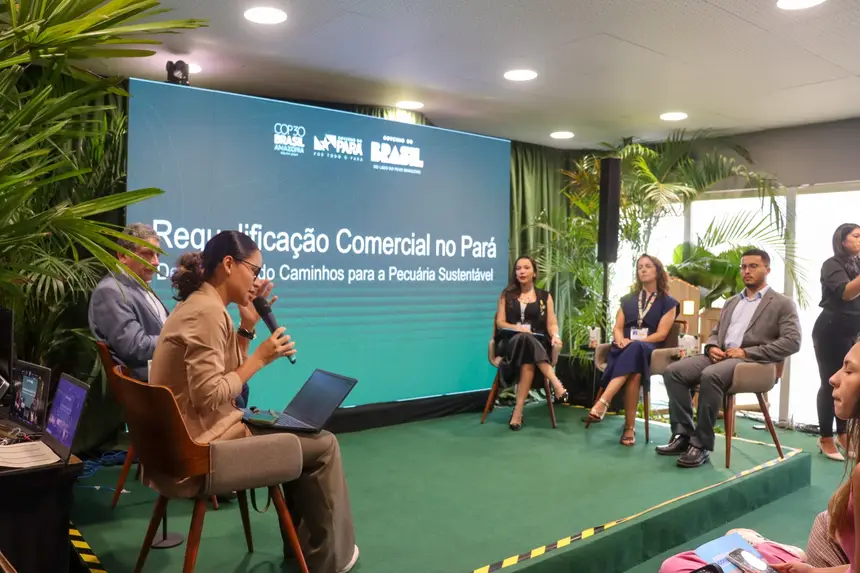Pará presents advances in implementing more sustainable livestock farming during COP30
The State Secretariat for the Environment and Sustainability highlights low-carbon actions, Producer Support Centers, and the Cattle Protocol, which help producers regularize activities and strengthen sustainable practices in the State

The State Secretariat for the Environment and Sustainability of Pará (Semas) participated, this Wednesday (12), in the panel "Commercial Requalification in Pará: Unlocking Paths for Sustainable Livestock Farming," held at the Pará Pavilion of the Green Zone at COP30, fostering discussion and clarifications on actions and initiatives aimed at consolidating more sustainable livestock farming.
The director of Climate Change at Semas, Indara Aguilar, highlighted state initiatives aimed at this requalification for low-carbon livestock farming and the enhancement of sustainable productive practices.
“Since the beginning of the Sustainable Livestock Program until today, we have seen significant advances in solving these bottlenecks and leading producers to the solutions they need. This has mainly happened through commercial requalification, which is the process of unlocking producers. Now, they can resolve their pending issues and return to the market, resuming their source of income and gaining access to environmental regularization mechanisms. This progress is only possible thanks to partnerships with institutions like TNC, IDH, and the producer support centers, which have helped us scale these solutions,” she emphasized.
Challenges of management and state structure
The state government still faces structural and operational challenges to ensure more agility in the processes of regularization and requalification in the field. According to Indara, the size and complexity of Pará require constant technical improvement and investment in new technologies.
“The state is very large, we have many registrations to analyze, many notifications to issue, and there is a constant need to increase and train our staff to give more agility to the processes. Beyond professional qualification, technological qualification is needed to serve and access the products and people who depend on this ecosystem,” explained the director.
Producer Support Centers (NAP)
On the occasion, she also highlighted the strategic role of the Producer Support Centers (NAPs), created to expand the reach of regularization and sustainability actions in the field. These spaces provide technical support to producers, disseminate information on traceability, and encourage productive improvements without the need to open new areas.
Indara Aguilar reinforced the role of the NAP in this requalification process. “The Producer Support Center is one of the most promising actions we have today. It is helping to scale solutions, bringing commercial requalification and also information on traceability and productive improvements, always within the already existing area, without the need to open new areas,” she stated.
Currently, the centers are already structured in Novo Repartimento and São Félix do Xingu and, recently implemented, in Altamira, with concrete plans for expansion to other regions of the State, such as the municipality of Marabá.
“We are very eager for all to come into operation and be expanded to other regions. I am sure this will represent a leap in the results we seek, strengthening support for producers and amplifying the positive impact of public policies in the territory,” Indara concluded.
Cattle Protocol
One of the most important milestones in the advancement of sustainable livestock farming in the Legal Amazon was the creation of the Cattle Protocol in 2019. The instrument emerged as a complement to the Conduct Adjustment Term (TAC) of Meat, signed in 2009, and represented a watershed by bringing clarity and objectivity to the processes of regularization and auditing in the sector.
Before the creation of the protocol, many producers faced difficulties due to a lack of guidance on the necessary documentation to regularize and return to trading in the formal market.
Communication and information capillarity

In addition to normative advances, Indara also emphasized the importance of communication and the dissemination of technical knowledge to ensure the engagement of producers and professionals who operate at the forefront of the process. The commercial requalification manual, developed in partnership with the Institute of Forest and Agricultural Management and Certification (Imaflora), has played a central role in this regard, helping to expand the capillarity of information throughout the Pará territory.
“Communication is essential for engagement, both of producers and technical responsible parties. The more people informed about the requalification process, the more we can achieve our goals,” Indara reinforced.
The manual has been essential for standardizing information and practically guiding professionals, strengthening actions in municipalities and ensuring that technical knowledge reaches all regions of the State in an accessible manner.
Text by Lucas Maciel/ Ascom Semas









